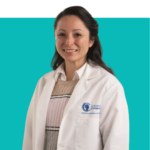
Hianca Andrades graduated with a Master of Public Health (MPH) in Community and Behavioral Health from the University of Iowa in May 2023. In the fall of 2020, the University of Iowa College of Public Health established a Maternal and Child Health Training Program funded by a HRSA MCH Public Health Catalyst Program grant. As a Maternal and Child Health (MCH) scholar, Hianca held a leadership position with the Maternal and Child Health Student Interest Group and successfully completed the program. During her studies, she conducted research on oral health for the aging community, disaster preparedness, and evaluation of Iowa’s Title V program across different counties. Under the guidance of Dr. DeShauna Jones, she aided in evaluating the Iowa Title V Community-Based Doula Project for African American Families as part of her practicum at the University of Iowa Institute for Clinical and Translational Science. Before her MPH, Hianca earned a BA in Spanish at the University of Iowa, where she taught Portuguese and encouraged students to pursue language classes. Post-graduation, she continued in research briefly before becoming the Maternal, Child, and Adolescent Health Coordinator at Johnson County Public Health. In her current role, Hianca oversees grant activities for maternal, child, and oral health. She also helps run the Johnson County Doula Project, funded by American Rescue Plan Act (ARPA) funds. This involves collaborating with the Doula Mentor responsible for mentoring and supporting the training of new doulas. The training encompasses both theoretical and practical knowledge of all topics related to childbirth and more. Hianca also works closely with the project manager to ensure the smooth coordination of all project components. Follow Hianca on LinkedIn!
Background
My practicum experience, coupled with research and coursework, has afforded me a solid foundation in Maternal and Child Health. My Master of Public Health (MPH) program provided opportunities to explore the Maternal, Child, and Adolescent Health (MCAH) realm and hold a leadership position. It also introduced me to new opportunities, including the Iowa Leadership Education in Neurodevelopmental and Related Disabilities Program (ILEND), funded by the Autism CARES Act. The ILEND program brings together master-level students from various disciplines. Across two semesters, we focused on developing leadership skills in areas such as public awareness, person and family-centered care, and policy advocacy. This comprehensive training involved lectures, discussions, activities, field trips, and community engagement with families. Shortly after completing my studies, I pursued the role of MCAH Coordinator at Johnson County Public Health. This position entails comprehensive responsibilities such as managing grant-related activities, fulfilling grant writing requirements, spearheading community outreach and education initiatives, and coordinating other related programs.
Before stepping into my current role, I worked as a research assistant during my master’s career, delving into Iowa’s Title V program. This involved conducting data collection with public health agencies administering Title V programs and comparing each model on a project led by Dr. William Story. Focus groups were conducted with Title V staff members in four different agencies. Subsequently, one-on-one interviews were held with clients from each agency to gather feedback on their service provision. My MPH program required a practicum experience, during which I chose to concentrate on maternal and child health. This provided me with the opportunity to contribute to the evaluation of a state-run doula project, refining my experience working with doulas.
When people inquire about how I secured my current position shortly after graduation, it essentially boils down to three key elements: diligently completing the required coursework, actively pursuing every available opportunity, including volunteer positions whenever possible, and embracing the Japanese term shoshin. In essence, shoshin embodies the mindset that the more I see, the less I know, emphasizing a continuous openness to learning and growth.
Competency 1 – MCH Knowledge Base/Context
In my current role as MCAH Coordinator, navigating the complex landscape of county-level public health has become a vital aspect of my work. While operating within the same state, the intricate variations in service models for Title V services across counties show the need for a nuanced understanding of local needs.
My responsibilities involve collaborating with programs like the Special Supplemental Nutrition Program for Women, Infants, and Children (WIC), Title V programs, and services such as the Healthy Pregnancy Program, oral screenings for pregnant individuals and children, immunizations, lead tests, and more. The dynamic nature of community needs continually astounds me, from addressing formula shortages on a nationwide scale to facilitating sign-ups for presumptive eligibility insurance, which helps individuals get needed medical care while waiting for a decision on ongoing Medicaid or Hawki insurance coverage. Daily, I encounter evolving challenges, such as maintaining funding sources for uninsured pregnant women and children under Title V coverage.
My motivation to work in this field stems from my personal identities—I am a woman, a Latina, and a non-native English speaker. Practical knowledge in MCAH is just as crucial as theoretical understanding. When advocating for Medicaid or Hawki enrollment in the community, my focus is not on complex terminology; it is on engaging with the community and comprehending their unique needs. This approach aligns with the belief that understanding and connecting with the community is essential for effective public health service delivery.
The Johnson County Doula Project stands out as a noteworthy initiative addressing community needs. Inspired by similar projects statewide, including the IHHS Community-Based Doula Project for African American Families, our project targets pregnant women who are affected by COVID-19. These families often face multiple barriers, such as limited access to healthcare, transportation challenges, low income, and language and cultural barriers. I am thrilled to contribute to this impactful project that aims to make a positive difference in the lives of those facing significant implications to their health.
Competency 3 – Ethics
Public health is inherently about the public, echoing the well-known slogan embraced by the Disability Community since the 1990s: “Nothing about us, without us.” This sentiment underscores the critical role of community engagement in county-level public health. The process demands creativity and a genuine willingness to listen and learn from the public.
Our commitment to community engagement is evident in our Maternal Health and Child Health/Oral Health grants, which require seeking input from the community. Collaborating with community partners, we convene bimonthly meetings for our Maternal Health Coalition group to build networks for other providers. We also actively seek input from patients in the clinic to gain specific insights into our processes.
However, building trust within the community presents a significant challenge fueled by understandable skepticism. The political climate has instilled fear, mistrust, and anger in some individuals, requiring local public health departments to actively earn and sustain that trust. We achieve this by engaging with community leaders and offering leadership roles within our organization. While the theoretical framework may seem ideal, the practical implementation remains challenging. When working with the community, it is crucial to recognize that our role is to serve them, prioritizing their needs over mere statistical objectives. Communities are weary of rebuilding relationships with local governments and tired of being abandoned once objectives are met. What they truly seek are services and opportunities, but weak relationships impede their ability to access these resources. The key is to approach community engagement not as a transactional exchange but as an enduring commitment to mutual benefit and shared well-being. After all, ethics should be the core of our community engagement practices.
MCH Knowledge & Ethics
In wrapping up, my time in county-level public health has shown me the importance of understanding local needs. Through working directly with communities and sticking to ethical principles, I have seen the positive impact of collaboration. As we face challenges, build trust, and put the well-being of those we serve first, community engagement is not just a process—it is a commitment to growing together. In this journey, ethics lead the way toward a future where public health serves everyone.

